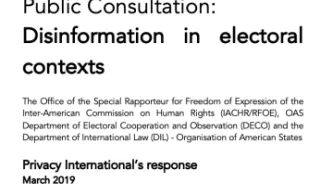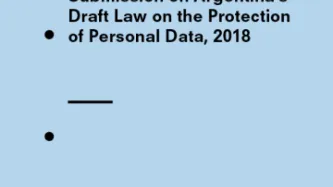Search
Content type: Examples
For US citizens who can access benefits, many states use electronic benefit transfer (EBT) cards, which function like debit cards, to distribute benefits. As of 2015, at least 37 states issued Temporary Assistance to Needy Families benefits, also known as welfare, through EBT cards.
http://www.ncsl.org/research/human-services/ebt-electronic-benefit-transfer-card-restrictions-for-public-assistance.aspx
Publication: National Conference of State Legislatures
Content type: Examples
Research from the Brennan Center shows minorities are primarily affected by new laws that restrict citizens access to voting through ID requirement, increased distance to polling station, inconvenient opening hours and hidden costs.
https://www.theguardian.com/world/2012/jul/18/voter-id-poor-black-americans
Writer: Ed Pilkington
Publication: The Guardian
Content type: Examples
The New York Times picked 16 categories (like registered Democrats or people trying to lose weight) and targeted ads at people in them. They used the ads to reveal the invisible information itself, noting that it is a "story of how our information is used not just to target us but to manipulate others for economic and political ends — invisibly, and in ways that are difficult to scrutinize or even question."
The article illustrates that even though data providers don’t…
Content type: News & Analysis
The first half of 2018 saw two major privacy moments: in March, the Facebook/ Cambridge Analytica scandal broke, followed in May by the EU General Data Protection Regulation ("GDPR") taking effect. The Cambridge Analytica scandal, as it has become known, grabbed the attention and outrage of the media, the public, parliamentarians and regulators around the world - demonstrating that yes, people do care about violations of their privacy and abuse of power. This scandal has been one of…
Content type: Advocacy
Consultation Submission
In March 2019, Privacy International submitted a response to a consultation on Disinformation in Electoral Contexts, led by the Office of the Special Rapporteur for Freedom of Expression of the Inter-American Commission on Human Rights together with the Department of Electoral Cooperation and Observation (DECO) and the Department of International Law (DIL) of the Organisation of American States (OAS).
In our submission we highlighted the importance of minmising data…
Content type: Examples
During the November 2018 US midterm elections, Moveon conducted an experiment to test whether it could cheaply and quickly maximise the effectiveness of digital persuasion. The project created a Facebook app called MO Research, and recruited people to answer survey questions about current issues via targeted ads; 400,000 respondents answered an average of five questions each via Facebook Messenger, along with providing information about their hometown, gender, and age that allowed MoveOn to…
Content type: Examples
A December 2018 report prepared by the Oxford Internet Institute's Computational propaganda Research Project and the network analysis firm Graphika for the US Senate Intelligence Committee found that the campaign conducted by Russia's Internet Research Agency during the 2016 US presidential election used every major social media platform to deliver messages in words, images, and videos to help elect Donald Trump - and stepped up efforts to support him once he assumed office. The report relied…
Content type: Examples
Facebook's latest tool for inspecting political ads showed that in the run-up to the US mid-term elections in November 2018, many of the same politicians who had been questioning Facebook about privacy and leaked user data were spending campaign funds on advertisements on the service. Between 2014 and 2018, the digital percentage of political spending rose from 1% to 22% (or about $1.9 billion); between May and November 2018 political spending on Facebook and its subsidiaries came to nearly $…
Content type: Examples
A 2018 study found that Twitter bots played a disproportionate role in spreading the false claim, made by US President Donald Trump shortly after winning the election but losing the popular vote in November 2016, that 3 million illegal immigrants had voted for Democratic opponent Hillary Clinton. After examining 14 million messages shared on Twitter between May 2016 and May 2017, Indiana University researchers found that just 6% of Twitter accounts identified as bots spread 31% of "low-…
Content type: Long Read
During the last World Economic Forum in Davos, the CEO of Microsoft joined the chorus of voices calling for new global privacy rules, saying the following in regard to the new European General Data Protection Regulation (GDPR):
“My own point of view is that it's a fantastic start in treating privacy as a human right. I hope that in the United States we do something similar, and that the world converges on a common standard."
We have come a long way. From tech companies fighting and…
Content type: State of Privacy
Table of contents
Introduction
Right to Privacy
Communication Surveillance
Data Protection
Identification Schemes
Policies and Sectoral Initiatives
Introduction
Acknowledgement
The State of Privacy in Argentina is the result of an ongoing collaboration by Privacy International and Asociación por los Derechos Civiles (ADC).
Key Privacy Facts
1. Constitutional privacy protections: While Argentina's constitution does not mention the word 'privacy', Section 19 has been taken by the…
Content type: News & Analysis
Federal law enforcement is deploying powerful computer hacking tools to conduct domestic criminal and immigration investigations.
By Alex Betschen, Student Attorney, Civil Liberties & Transparency Clinic, University at Buffalo School of Law
Hacking by the government raises grave privacy concerns, creating surveillance possibilities that were previously the stuff of science fiction. It also poses a security risk, because hacking takes advantage of unpatched vulnerabilities in our…
Content type: Press release
FOR IMMEDIATE RELEASE
December 21, 2018
CONTACTS:
Alex Betschen, Civil Liberties & Transparency Clinic, [email protected], 716–531–6649
Colton Kells, Civil Liberties & Transparency Clinic, [email protected], 585–766–5119
Abdullah Hasan, ACLU, [email protected], 646–905–8879
NEW YORK — Privacy International, the American Civil Liberties Union, and the Civil Liberties & Transparency Clinic of the University at Buffalo School of Law filed a lawsuit today…
Content type: News & Analysis
Photo credit: US Immigration and Customs Enforcement
The trial of Mexican drug lord Joaquin “El Chapo” Guzman started in New York back in November 2018. But last week, the jurors were presented with a trove of new key evidence: dozens of text messages exchanged between Guzman, his wife, and his mistresses.
The reason behind this set of revelations? Guzman had been spying on his wife and mistresses, using publicly-available surveillance software called FlexiSpy. Once installed on his targets…
Content type: Examples
In July 2018, Robert Mueller, the special prosecutor appointed to look into Russian interference in the 2016 US presidential election, charged 12 Russian intelligence officers with hacking Hillary Clinton's campaign and the Democratic National Committee by spearphishing staffers. The charges include conspiracy to commit an offence against the US, aggravated identity theft, conspiracy to launder money, and conspiracy to access computers without authorisation. The hack led to the release of…
Content type: Examples
Facebook ads purchased in May 2016 by the Internet Research Agency, a notorious Russian troll farm, urged users to install the FaceMusic app. When installed, this Chrome extension gained wide access to the users' Facebook accounts and web browsing behaviour; in some cases it messaged all the user's Facebook Friends. The most successful of these ads specifically targeted American girls aged 14 to 17 and said the app would let them play their favourite music on Facebook for free and share it…
Content type: Examples
With only days to go before the 2018 US midterm elections, a federal judge ruled that the state of Georgia must change its "exact match" law that required voter registrations with even the tiniest variation from other official identifications to be flagged as potential non-citizens unless they could produce proof of identity. A group of civil rights groups sued Republican secretary of state Brian Kemp, in charge of the elections despite also running for governor, to change the procedure, which…
Content type: Examples
In August 2018, the US Democratic National Committee notified the FBI that the San Francisco-based security company Lookout and the cloud service provider DigitalOcean had detected an attempted hack targeted at the DNC voter database. The attack took the form of a fake DNC login page intended to trick people into disclosing their usernames and passwords thinking they were accessing the DNC's VoteBuilder platrform. Lookout believes it found the site within 30 minutes of its going up online, but…
Content type: Examples
Shortly before the 2018 US midterm elections, Georgia secretary of state and gubernatorial candidate Brian Kemp accused Georgia's Democratic Party of hacking into the state's voter registration database, though without providing any evidence to support the claim. The motives behind the claim were unclear, but a report published by WhoWhatWhy suggested that the claim may have referred to a cybersecurity investigation conducted by the Democrats that uncovered significant flaws in the state's…
Content type: Examples
In July 2018, Election Systems and Software (ES&S), long the top US manufacturer of voter machines, admitted in a letter to Senator Ron Wyden (D-OR) that it had installed pcAnywhere remote access software and modems on a number of the election management systems it had sold between 2000 and 2006. The admission was in direct contradiction to the company's response for a New York Times article earlier in the year on US voting machines' vulnerability to hacking. ES&S says it stopped…
Content type: Examples
In the run-up to the November 2018 US midterm elections, Vice tested Facebook's new system of mandatory "Paid for" disclosure intended to bring greater transparency to the sources of ads relating to "issues of national importance". Placing political ads requires a valid ID and proof of residence. Vice found that Facebook quickly approved ads the site attempted to place that named Islamic State, US vice president Mike Pence, and Democratic National Committee chair Tom Perez in the "Paid for"…
Content type: Examples
A combination of entrenched and litigious voting machine manufacturers with immense control over their proprietary software and a highly complex and fragmented voting infrastructure mean that even though concerns were raised as early as 2004 about the security of US voting machines, the 2018 midterm election saw little improvement. The machines in use in the more than 10,000 US election jurisdictions are all either optical-scan or direct-recording electronic (DRE). Optical-scan, which scans…
Content type: Examples
In September 2018, when Massachusetts state police tweeted a map of responses to fires and explosions during a gas emergency, they inadvertently revealed that they were closely monitoring several activist groups, including a Facebook group for Mass Action Against Police Brutality, the Coalition to Organize and Mobilize Boston Against Trump, Facebook 413, Facebook MA Activism, and Resistance Calendar. The image was taken down and cropped after half an hour, but it spurred journalists to ask…
Content type: Examples
In September 2018, Google warned a selection of US senators and their aides that their Gmail accounts were being targeted by foreign government hackers. Google has issued warnings of phishing attempts by state-sponsored actors since 2012, though getting a notice does not mean the account has been compromised.
https://www.cnet.com/news/google-warns-us-senators-of-foreign-hackers-targeting-their-gmail-accounts/
Writer: Richard Nieva
Publication: CNet
Content type: Examples
In the run-up to the 2018 US mid-term elections, researchers found that the dissemination of fake news on Facebook was increasingly a domestic American phenomenon rather than, as in the 2016 presidential election, an effort driven by state-backed Russian operatives. Removing such accounts (Twitter) and pages (Facebook) is tricky in the US, where the boundary between free speech and disinformation is particularly sensitive. In addition, domestic disinformation is harder to distinguish. One of…
Content type: Examples
In the months leading up to the US 2018 midterm elections, Republican officials in Georgia, Texas, and North Carolina made moves they described as ensuring voting integrity but which critics saw as blocking voter access. In Georgia, where Secretary of State Brian Kemp is charged with enforcing election law and was simultaneously running for governor, election officials blocked 53,000 applications to register, 70% of which are those of African-Americans, under a law requiring personal…
Content type: Examples
A few months before the US 2018 midterm elections, the Trump campaign team signed a contract with the newly-formed Virginia-based company Excelsior Strategies to exploit the first-party data the campaign had collected. The contract was set up by Trump's campaign manager, Brad Parscale, who built the list as the digital director of Trump's 2016 campaign and began renting it out soon after the November 2016 elections.
Subject to the Trump's campaign veto authority, Excelsior rents out this…
Content type: Examples
A little over a month before the US 2018 midterm elections, Twitter updated its rules to reduce manipulation of its platform. Among the changes, the company outlined the factors it would use to determine whether an account is fake and should be removed, provided an update on its automated detection and enforcement actions, and announced some changes to its user interface, which included reminding candidates to turn on two-factor authentication and encouraging US voters to register and vote.…
Content type: Advocacy
In September 2018, the National Executive sent the proposed Data Protection Bill to the National Congress. The proposed law was directed to the Senate and it will be considered by two commissions: the Commission of Constitutional Affairs (Comision de Asuntos Constitucionales) and the Commission of Rights and Guarantees (Comision de Derechos y Garantías).
Privacy International welcomes the continued efforts by Argentina to provide protections for the right to privacy, already enshrined in the…
Content type: News & Analysis
Taylor Swift may be tracking you, particularly if you were at her Rose Bowl show in May.
According to an article published by Vanity Fair, at Swift’s concert at the California stadium, fans were drawn to a kiosk where they could watch rehearsal clips. At the same time – and without their knowledge - facial-recognition cameras were scanning them, and the scans were then reportedly sent to a “command post” in Nashville, where they were compared to photos of people who are known…


























